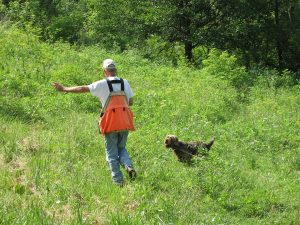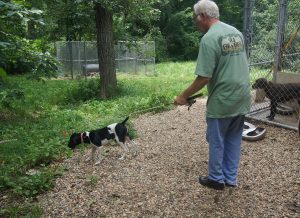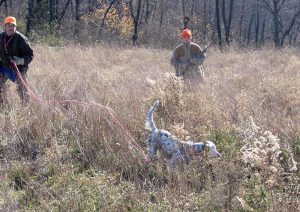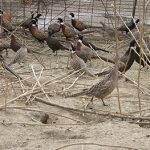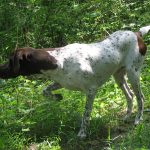Pointing Dog Pointers: Man-Made Faults
POINTING DOG POINTERS April 2017
By Bob and Jody Iler
If you’re familiar with our columns and articles in The Pointing Dog Journal, you know we’ve often referred to “man-made faults” when writing about different problems and training issues encountered with our pointing dogs. This month we’ll share some of the common man-made faults that a dog can develop and how you can prevent them in the first place!
Blinking (avoiding) Birds
The dog that scents a bird and then avoids it as though it isn’t there has developed an unpleasant association with birds. This pup may have had a poor introduction to birds, or he may have gotten spurred by a rooster. The flush of larger birds will often spook a young inexperienced pup; hence the necessity of gentle bird introduction, starting with smaller gamebirds and working up to larger ones. Moving too fast in your training can also cause blinking; if the excitement of hunting, scenting, pointing and chasing birds is not being instilled in a sequence that adapts to each pup’s unique time frame, a young dog won’t develop the crucial enthusiasm and happy association needed.
Not Pointing
If your pup started out pointing the “wing on the fish pole” you know she has point. But sometimes we don’t stop there. We overdo this little test and forget that our pup needs to be pointing with her nose, not her eyes. Since birds can be scarce for the average person, some folks may use a dead or frozen bird, planted in some taller grass, for pup to find and hopefully point. Unfortunately, this only teaches a pup that she can jump in and catch the bird, and that she doesn’t need to point first!
If you overuse bird traps with a young dog, she will soon learn that she can jump in on traps, which will also soften or eliminate pup’s point. Using poor flying birds that pups can jump in and catch will also discourage pointing instinct.
False Pointing
Some dogs have a lot of pointing instinct and will point even if there’s no bird there. By excessively praising the dog that false points, this behavior is encouraged. This is not the same as the dog that points, relocates, and points again as it works a running bird.
Jumping in on Birds
Pups that jump in on birds have learned that they can catch them. These pups will often just flash point and may soon quit pointing entirely (as described above). Again, overuse of bird traps and using poor flying birds encourages this behavior.
Flagging on Point
When a pup goes on point and its tail continues to move, or “flag,” this can be due to excessive handling while the dog is on point, such as continuing to jerk the checkcord and commanding “whoa” repeatedly. Leaving the pup on point for too long can cause uncertainty that results in flagging as well.
Crouching on Point
Too much training pressure or trying to teach too many things at one time can cause a dog to crouch or even lie down on point. This can also happen when a young dog is pushed too fast, such as when trying to steady a dog to wing and shot before the dog is ready to handle this type of training.
Bird Shyness
Improper introduction to birds (as described above) can cause a young pup to become bird shy. And again, a bad experience in the field, such as getting spurred by a rooster, can cause this. Bird releasers, when used for young, inexperienced pups, can also cause fear of birds, particularly if the bird is released close to the young student, startling him with the whir of wings. Any unpleasant association with birds can result in a bird shy pointing dog!
Gun Shyness
Improper introduction to gun noise by not graduating from smaller caliber to larger, over time, can definitely create gun issues with a pup. Not letting the pup chase the bird while developing him to the various gun levels can cause gun shyness. Paying no attention to the reaction of your pup as he experiences gun noise can lead to problems. And obviously, tying your dog to a tree while shooting or taking him to a gun range to “get him used to gunfire” will very likely ensure that he will be gun shy!
Quits Retrieving
A natural retriever that quits retrieving may have had a bad experience with a bird that has turned him off of birds. One such experience would be getting spurred; another would be retrieving a bird that gives him a mouthful of feathers that he doesn’t like, such as a dove.
More often though, a dog can quit retrieving when he has too many birds shot over him in any given time. It’s natural to think that if we have one good retrieve, won’t more be even better? Often a good retriever will just quit retrieving and continue hunting if too many birds are shot over him too often in a session.
Hard Mouth/Chewing on Birds
Playing tug of war with young pups and allowing them to manhandle toys and run away with dummies can encourage this behavior with birds as pup matures. Allowing a dog to play keep away or run off with the retrieved bird creates more opportunity for the dog to become hard-mouthed or chew on the bird.
Running Away with Bird/Running Too Wide
Dogs that run away with a retrieved bird or range out too far without paying attention to you have not had a good foundation of training. Letting a dog have his head in the field without laying this groundwork first is asking for trouble. If a dog’s owner/handler continues to call, shout or whistle commands without being able to enforce them, the dog is actually learning that he can ignore the commands. When the checkcord is not used for a long enough time to instill proper response and control, the result will be a dog that takes off when the checkcord is removed.
Hunting Too Close/Not Hunting at All
Often a dog that hunts too close or maybe even not at all has had too much training pressure instilled in him. Too much focus on obedience before bringing out the enthusiasm for birds and bird work can also keep pup too close. In older dogs, overuse of the e-collar and/or working on too many areas of training at one time will cause a dog to shut down. Not remembering that hunting is supposed to fun for the pup can result in problems that may be difficult to fix.
We don’t deliberately set out to create man-made faults in our dogs. By using our common sense, thinking things through from our pup’s point of view, and asking good questions and finding the right answers, we can prevent these faults from developing. Remember: An ounce of prevention is always worth the pound of cure!
Pointing Dog Pointers features monthly training tips by Bob and Jody Iler, who own Green Valley Kennels in Dubuque, Iowa. Bob and Jody have trained pointing dogs for over 35 years and have written many articles for The Pointing Dog Journal.



